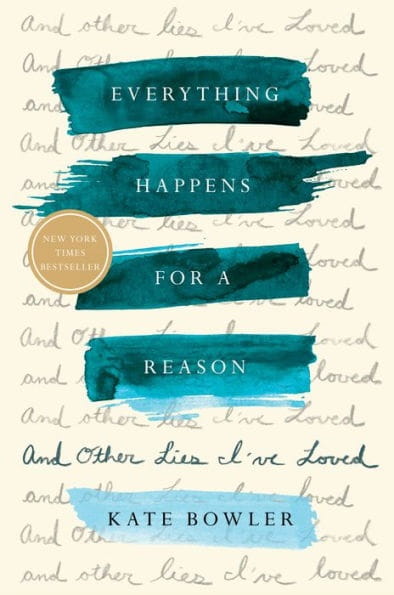Kate Bowler Explains How to Be Present with the Aging, the Sick and the Dying

I said to the 37-year-old, married, mother of a toddler, seminary professor with Stage IV colon cancer…
“Back on March 23, I read your New York Times article, ‘What to Say When You Meet the Angel of Death at a Party.’ A friend had posted it on Facebook. And it meant more coming from this friend to hear that it was ‘one of the most valuable articles I’ve ever read,’ because she lives month-to-month with treatments for an auto-immune deficiency. I commented to her, wow, this writer has a very ‘wise, gentle, strong and faithful voice’ that is surely needed today. Ten days later, a PR email showed up offering the chance to interview the author of that article and read her book, and it just didn’t feel coincidental to me.
So I just wanted to let you know it was a gift to receive your book; I don’t think I’ve ever highlighted so much of one. It came to me at an important time in my life, too, so thank you first of all for writing it.”
And Kate Bowler replied in her clever, collected, clear-voiced way, “Oh, thank you. That means a lot to me. The great dream for me is that we just get to have more language for all of us who are living in these spaces. My perfect world is come true when other people say, ‘Oh my gosh, yes,’ and don’t look at me with cocker spaniel-face.”
See, Kate is still with us, but she is not, quote/unquote, healed. She must undergo regular treatments to prevent her tumors from growing, but she has not come to the end in the three years since her diagnosis. She knows her (likely) killer; she also continues to teach at Duke Divinity School, to raise a son, to fly to Atlanta to plug into machines, and to write. She wrote her dissertation on the prosperity gospel, but her latest book about her illness is called Everything Happens for a Reason (and Other Lies I’ve Loved). It’s an exceptional read, easy to access despite the candor of an according-to-plan Christian life interrupted by cancer. The appendices alone, which cover what to say and what NOT to say to people in Kate’s position, are worth the price of the book.
But for me personally? Moving into my late-40s with a couple minor health issues and almost-surgeries in the past year was all it took to give me a renewed outlook on suffering, isolation, community, comfort, wasted time and more. Last week, as I visited both my grandmother’s nursing home and the hospital where my beloved aunt was birthed into eternity on my actual birthday, it all came full circle. I was able to be a rock for the family, share the joy of what we know, but also grieve for what we’ve lost. So it was that my timely interview with Kate was one I greatly anticipated racing home for, and my most deeply meaningful in 13 years of doing them...
Crosswalk: One of the things I noticed in reading Everything Happens for a Reason is that there seems to be a tension there that comes from what you describe as “the in-between,” existing in a space between living and dying. But I described it to myself as a ‘relaxed tension,’ like listening to a friend late at night. I’m just curious how you came to arrive at that unique tone for such a topic; it neither seemed angry nor simplistic. So is that your voice, or is that something you arrived at?
Kate Bowler: Well, weirdly, this was the first thing I’ve ever written that sounded like me. I typically write academically. And sometimes I’d find that if I was at a party and I’d tell a story someone would say, “Oh, is that what your book is like?” [Laughs]. And I’d say, “Oh… no… no, I’m so sorry.”
So I guess it was also a conscious decision on my part to suspend reading other people’s memoir genres when I was writing, and just only write from a place of deep honesty. The book sounds exactly like me because it was the truest expression of how I think. And it was my attempt to come to grips with something so deep that it was hard for me to express any other way. So, thank you! But it is mostly just the inner workings of my brain.
CW: I’ve often said that humanity might understand suffering a lot better – I mean, after all, it’s common to everyone – if it weren’t also so relative. As in, “That’s nothing compared to what I’ve had to go through.” Do you find that to be true?
KB: Yeah! And we also, in a very negative way, can be the Perspective Police, in which people want to immediately teach you a lesson about how hard it could be or how lucky you are. Sometimes it could be your own internal chastisement, that you really shouldn’t be so upset, or you really shouldn’t be so surprised that this all came apart. I think we’re so quick when we’re suffering to turn against ourselves, and blame ourselves for not having seen it coming? Or for having taken it so personally. Because usually suffering isn’t personal, it just feels that way. I mean, cancer isn’t personal, but man, I have taken it personally.
CW: Speaking of which, it seems like there are so few things that we can still make fun of in this society, but Death sometimes is still a punchline.
KB: Yes! Yes.
CW: How is it that everything else has become off-limits but not this?
KB: Yeah, well… [laughs], because it is the one great inevitability! And part of it, too, is our youth-obsessed culture. Being old is something to be distanced. I’d guess even once a week someone says [to me], “Oh, you never want to get old.” As if it were such a punishment not to be beautiful or not to be decorative. And I just think we struggle so much to account for just how awful it is that we might come to the end of ourselves. And yet it’s one of our fundamental points of common humanity. We should all be worried about our neighbor limping toward the end just like we are.
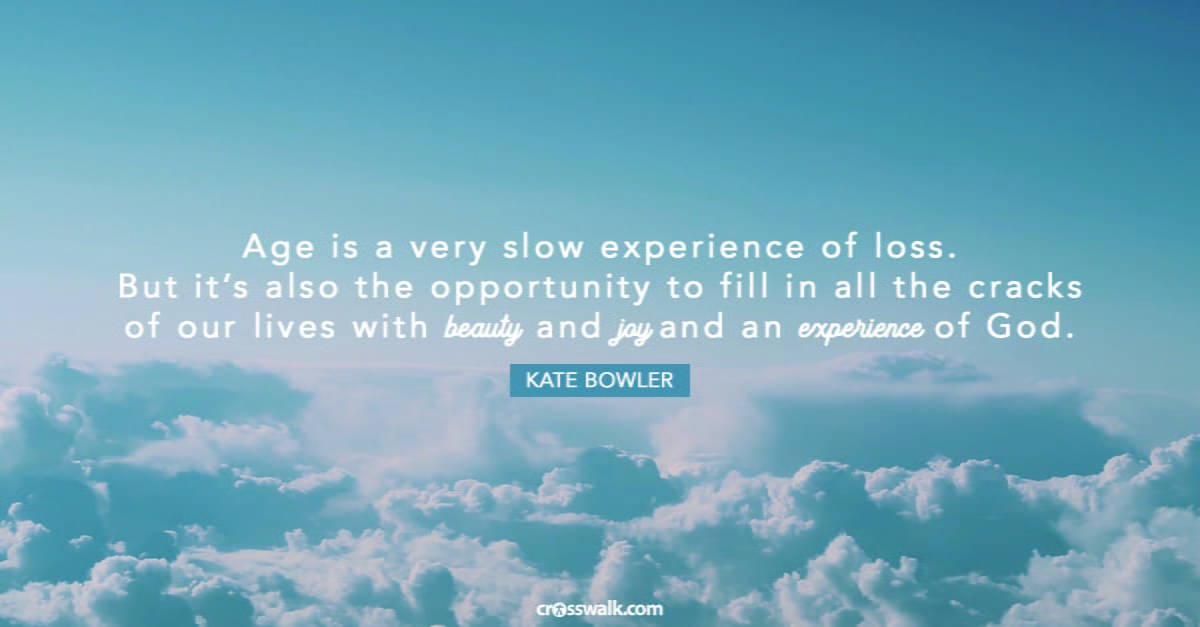
CW: Well that’s what really struck me – I marked it on a couple different pages in your book with a question mark of “paradox?” – when you acknowledge at one point that your father-in-law was right that “with age it’s one loss after another,” but later, you’re flatly telling your mother-in-law that “aging is a blanking privilege.” So… it’s both, right?
KB: It is both, yeah! And… I just think it’s really hard to lose things. And age is a very slow experience of loss. But it’s also the opportunity to fill in all the cracks of our lives with beauty and joy and an experience of God. So it’s a funny thing to watch us all grapple with. I think we all want to be like the Real Housewives. You know, just Botox til the end? And instead we’re all going to see our faces fall off and no longer be able to play tennis [laughs]. Coming to grips with that!
I think, too, the way that we narrate the civil religion that we live in is that life has to be about new possibilities – only beginnings and never endings. And I’ve just been facing a lot of endings. And so I find that language really thin and frustrating.
CW: I’m sure. And that leads me into my next question, which is about how we all deal with mortality differently, even in the Church. I really liked your insight into one acquaintance living in an apocalyptic future, and another was stuck in the past, and you thought you were in the center – the now – until you concluded that you don’t really know how to live there. And that brought me to a stop, and I wrote, “I appreciate you avoiding easy answers, Kate, but can’t you give me more?” I mean, how do you navigate the ‘now’?
KB: This is the great struggle for me. Because I was, oh man I was so good at living in the almost-future. It made me feel productive. Almost everything I’ve ever been rewarded for is because I lived there. You know, I’m 37, and I just got tenure like a hot minute ago, a couple weeks ago. And that’s something I’ve been working for since I was 18. That means actually half my life – not including the time in which I was learning to ride a bike and really rockin’ a side ponytail – I’ve just been working towards something of constant deferment. And so I continue to struggle with what it means to feel the fullness of the present. And sometimes that is the work of the Church; it binds us into seasons. Sometimes, it’s just the work of families, it forces you to do your laundry and wash your dishes. And sometimes it’s just learning to turn the TV off and shut up, and just say, “God, are you here? And what do you have for me now?”
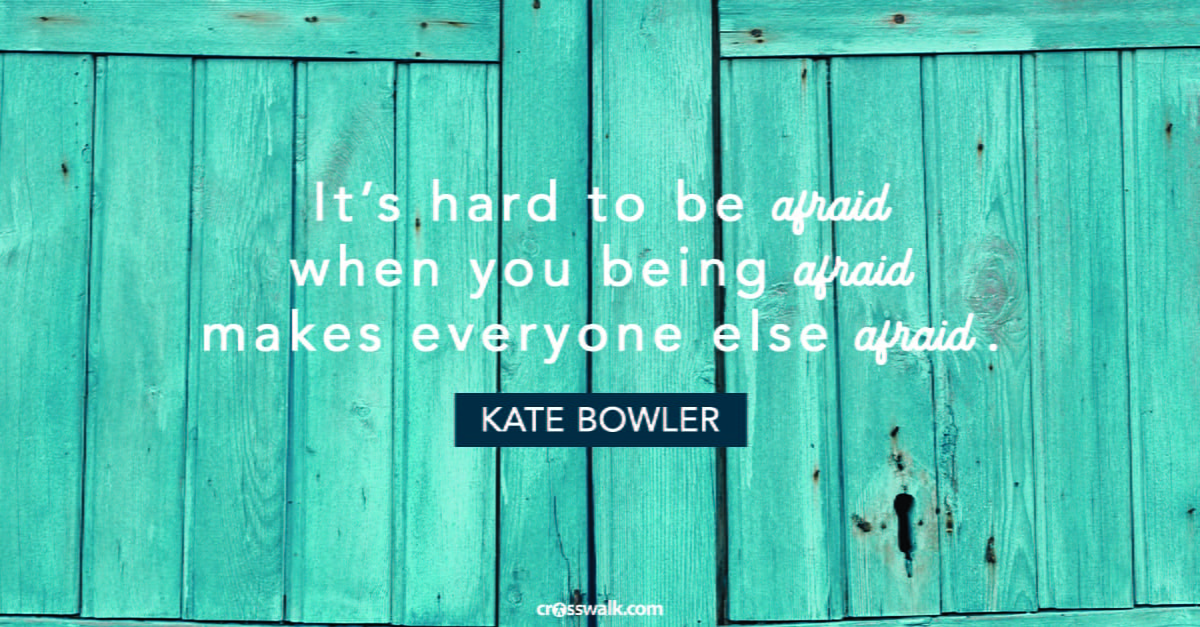
CW: This book would not be nearly as unique as it is without the fact that you previously spent so much time writing a definitive history of the prosperity gospel, and that story swirls into your current one. Can you sum up how that informed your content and your tone?
KB: Oh sure, because [writing about the] prosperity gospel was one of the first things that made me realize that I’m a jerk. You know, because I started it with that car accident’s distance that scholars can have, where we think, oh isn’t that strange, they really want God to give them everything!
And all that time with them, it really helped me come to an understanding of just how basic we all are, how much we all want these common things: healthy bodies, and teenagers that obey, and bodies that are slightly decorative. And so that had sort of informed the compassionate-observer take that I have tried to develop? Or at least work on?
It wasn’t really until I got sick that I felt like it was this deep, sometimes dark, interior work of saying, “Oh man, maybe I was really like this all along.” Maybe so much of my faith life was informed by the same kind of arrogance that says that I can expect a guarantee, that everything was supposed to work out for me, just because I’m, you know, so hard-working or, all the things I like about myself. It’s been hard to have that same compassion with myself because I was pretty horrified to realize the depths of it.
But I sort of want that compassion, too, for other people, because the other bit that was a surprise was how hard it was. I thought, “Well, I’m not a prosperity believer! Surely it shouldn’t be so hard for me to tell my friends and family and people who love me that I’m not sure how this is going to work out.” I hadn’t yet learned the way that sick people talk when they’re trying to be very still and help everyone get through, at the same time as they’re not sure that they have enough to make it through the day. I mean, it’s hard to be afraid when you being afraid makes everyone else afraid. So I think that’s partly why I wrote everything down; I was too nervous to say all this out loud. Hard questions like, “What if I’m not myself anymore? What if this changes me? What if I lose all my friends? What if I can never make new friends, because my life is so dramatic? What if no one wants to be close to someone who’s dying?” You start to feel like, what if you’re just never yourself again? You need to come to some kind of accounting of what it means. Because the people who really love you will lie to you! [Laughs] They will say, “Nothing is lost,” because they love you. But it is a lie.
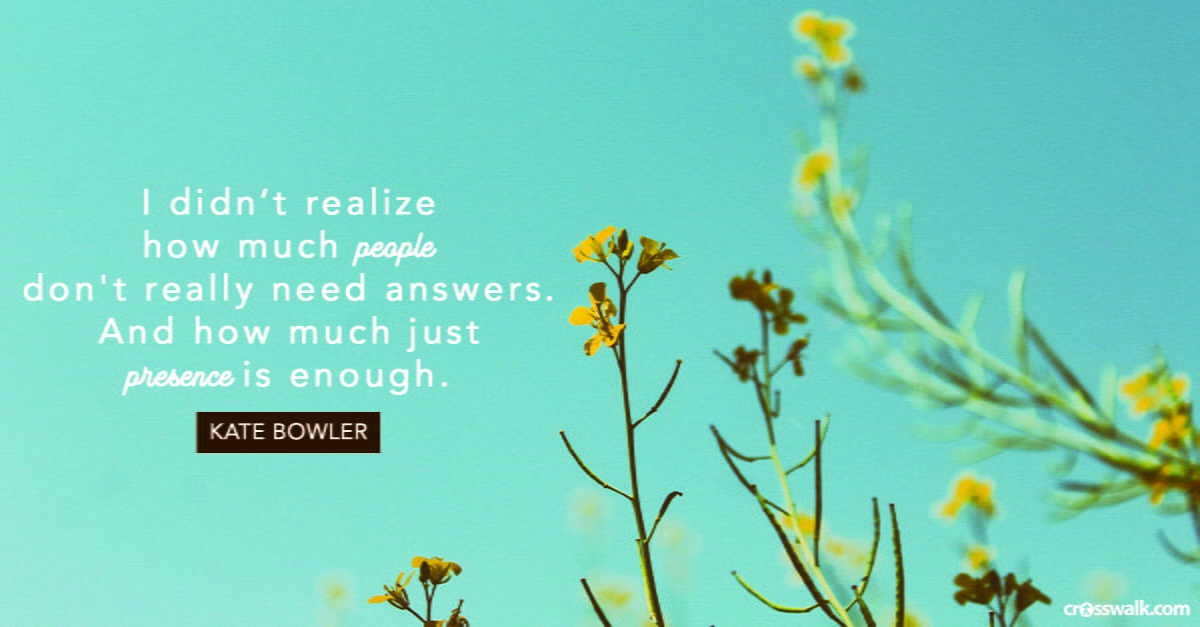
CW: You call it unkind when you have a thought like, “I’m preparing for death and everyone else is on Instagram.” I called it what I needed to hear in that moment. So how would you help your pre-cancer self to become, I don’t know, more aware, more loving, more considerate, more available to the infirm?
KB: I didn’t realize how much people don’t really need answers. And how much just presence is enough. How much just a loving space [means] between you that says, I know I can’t fix this for you, but I am going to borrow a little courage to stand here with you in it. I think pre-cancer Kate would have been pretty nervous to not fix other people’s problems, too. I know my problems make people very uncomfortable because they are terrible.
CW: Right! But don’t you think that’s maybe one reason why isolation – I’ve been learning a lot about this myself of late – is such a horribly real thing? Because people don’t necessarily have answers, that it contributes to it; we don’t know what to say, or, heaven forbid, we start spouting off those well-meaning platitudes you love so much which contribute to the title of your book. So what can we do to combat this kind of isolated suffering that really is separating needy people in an era in which we’re supposedly more connected than ever?
KB: Yeah. It’s not usually in words. It’s sometimes just in deeds, like presence, or time together, or casseroles. But usually it’s just an experience of solidarity, the willingness to just walk beside me even if we’re in the cancer clinic near the bloodwork where people’s humanity is literally spilling out everywhere. It takes someone who really loves you to take a deep breath and swallow and muster up a little courage to be in that with you. And then for you to accept the fact that their love for you is not a burden to them. It requires both people to agree, and that’s a tough bargain.
CW: I was out last week, visiting my aunt who just passed, but I noticed that my staff had published – totally coincidentally – an article titled, “5 Reasons Christians Don’t Visit the Sick or the Dying.” I just wanted to give you a chance to guess: if you were writing that article, what do you think would be listed there?
KB: One, “I wouldn’t know what to say.” Two, “They probably don’t need me.” Three, “It would be really awkward.” Just the sheer awkwardness. Those would be the three that come to mind. There’s so many reasons why other people’s failing bodies make you want to moonwalk out the door.
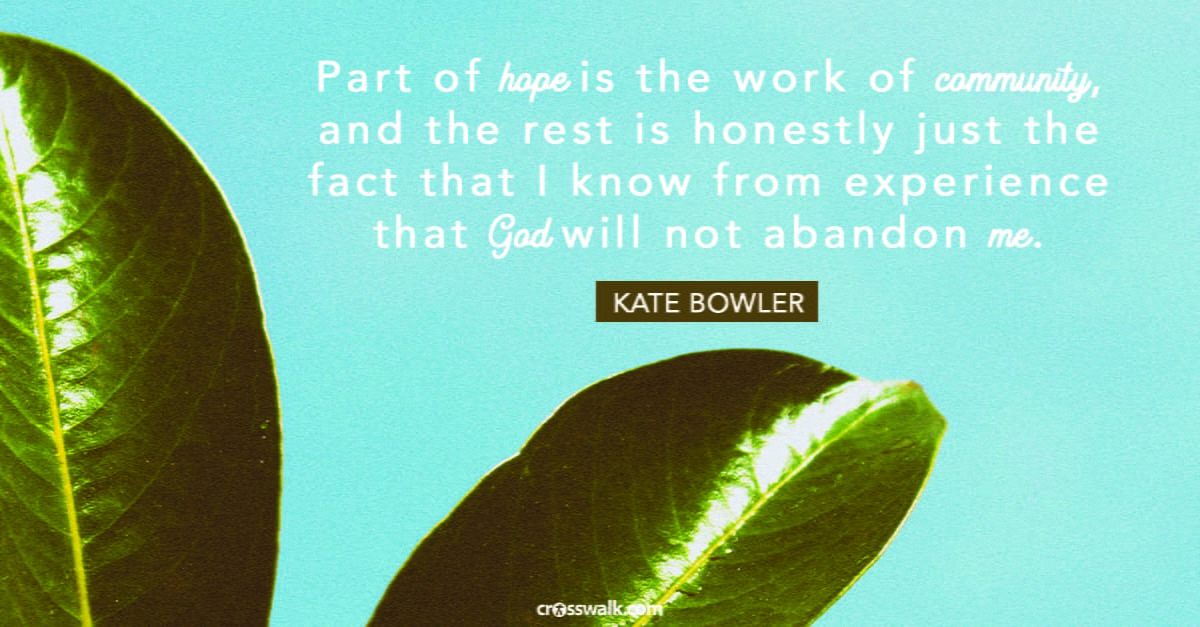
CW: On the flip side, what gives you hope?
KB: I guess how little it takes for people’s love to make a huge difference. I was really surprised by how quickly my cup felt full again. And how being really basic is such a gift. Like if I just need a ride to the airport, or a little bit of food, and maybe some airline points, those things would actually change my entire life; people really can meet your needs. And that was such a relief to know that people could step in where there was space. Part of [hope] is the work of community, and the rest is honestly just the fact that I know from experience that God will not abandon me; I don’t really have to work hard in that sense to know that God is the one who will actually show up.
Kate Bowler is a historian at Duke Divinity School, assistant professor of the history of Christianity in North America. Her book, Blessed: A History of the American Prosperity Gospel (Oxford University Press, 2013), received widespread media attention as the first history of the movement based on divine promises of health, wealth, and happiness. Kate researched and traveled Canada and the United States interviewing megachurch leaders and everyday believers about how they make spiritual meaning of the good or bad in their lives. Her work has been featured in the New York Times, The New Republic, The Guardian, TIME Magazine, The Atlantic, The Economist, The Washington Post, NPR, and the BBC. In 2015, she was unexpectedly diagnosed with Stage IV cancer at age 35. She lives in North Carolina with her husband and son. Find more from Kate at katebowler.com.
Publication date: May 18, 2018
Image Courtesy: Thinkstock/KatarzynaBialasiewicz
Originally published May 18, 2018.


